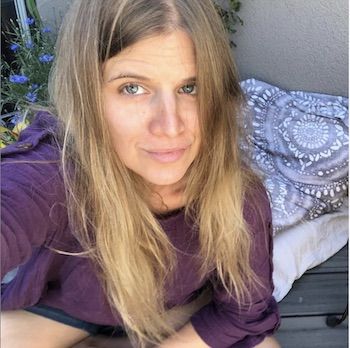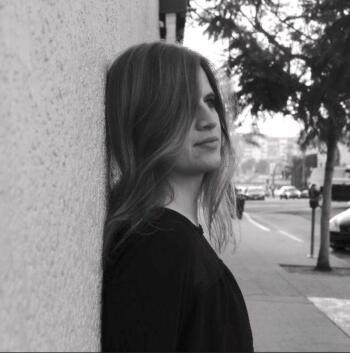1294 Stories of purposeful ambiguity
Erase and Rewind
by Meghan Bell
Toronto: Book*hug Press, 2021
$20.00 / 9781771666787
Reviewed by Zoe McKenna
*
 The debut short story collection from Vancouver-based writer Meghan Bell, Erase and Rewind, asks its women characters, and readers alike: what is “a narrative you can live with?”
The debut short story collection from Vancouver-based writer Meghan Bell, Erase and Rewind, asks its women characters, and readers alike: what is “a narrative you can live with?”
While Erase and Rewind is Bell’s first published collection, her influence on Canada’s literary scene is striking. Alongside publications in journals across the country, including The Walrus, Grain, Prairie Fire, and others, Bell also served as a publisher for Room Magazine from 2016 – 2019. During this time, Bell co-founded “Growing Room,” a literary festival promoting the voices published within Room’s pages — those of “women (cisgender and transgender), transgender men, Two-Spirit and nonbinary people.”
Women — how they are positioned within literature and beyond — motivate and connect each of Erase and Rewind’s thirteen short stories. From a sexual assault victim who reverses time in order to forget her abuse, to a girl left to reckon with the world after her sister’s apparent suicide, to an athlete with an unwanted pregnancy, Bell is intent on illuminating the various complicated and unique experiences of womanhood.
More than once throughout the collection, Bell presents characters who struggle against and within the societal expectations of what it is to be a good woman, and a good feminist. In the opening story, “Erase and Rewind,” Louisa reflects on how she had always stayed silent in terms of her political beliefs, for fear of “get[ting] feminism wrong,” as many other public-figure feminists already had, “according to the internet.” Later, Louisa frets that her objections to her sexual assault were too weak, and could have been “interpreted as consent.” In a later story, Jill, a hockey player with an unwanted pregnancy fathered by her team coach, frets over her political status: “I wonder if I can call myself a feminist, when I hold my tongue on the ice (most of the time), but I can’t stop thinking the sexist slurs. What’s a word for a woman that ends with U-N-T? Aunt. Yeah, not that one.” Jill wonders, after sleeping with her coach and falling pregnant, whether she can “call herself a feminist when [she is] so willing to be a victim.” It becomes clear that for Bell, the intersection and divergence between what is thought and said, and how these contradictions can manifest into a political position is intricate, and often troublesome.

Each story in the collection is remarkably vivid, to the point of feeling almost tangible. This is especially true of the short, script-like story, “I Was Made to Love You,” wherein a plasticine model gradually removes parts of herself in order to create and maintain a friend and partner. At times, these descriptions are gleefully West Coast-specific, with images such as “the width of a starfish hand” used to create detail. “I Was Made to Love You” also highlights Bell’s varied use of form and perspective throughout the collection. Scripts, short episodic segments, and first, second, and third person perspectives make the style of the collection dynamic. In comparison, the characters within and between each story tend to quickly feel stagnant. Each story is short and direct. There are no complete character arcs and rarely any sense of resolution by the stories’ close. The women of these pages suffer, and reflect on their suffering, but little else.
Despite somewhat listless characters, the collection nonetheless offers touching and troubling meditations on womanhood. Alongside an explicit investigation into what does and does not define a feminist, Bell punctuates her stories with broader nudges towards the question of what it is that society expects or demands of women. In “Anything to Make You Happy,” Lisa, who unexpectedly falls pregnant and quickly miscarries, berates herself: “Be tougher.” Yet, when she struggles to process the loss of her baby, Lisa similarly self-criticizes for her lack of emotion: “She had always been such a crybaby and now that something had happened to her that was really worth crying about, she didn’t care. Why didn’t her body care?”
Surprisingly, aside from ambiguous allusions to diet culture, considerations of the body are absent throughout Bell’s collection. Even “Pieces,” a segmented story with body parts as section headings — “Hair,” “Mouth,” “Ears,” and so on — maintains focus on the emotional and psychological rather than the physical: “Mouth: You’re the worst liar in the world.”

As a result of this rejection of the physical, some of Bell’s stories push the boundaries of reality, and breach literary fiction in order to dabble in genre. Time travel and superhero fathers lend a fantastical element to several stories in the collection, and these appear unsignalled, hidden amongst the normality of other stories. In this way, those instances of trauma that should be uncommon or exceptional become mundane, and the surrealist bent to the collection serves to underline how often trauma becomes normalized as a part of everyday life for many women.
The surrealist approach also serves to create the opportunity for interpretation. Rather than presenting an authoritative overview of what it means to be a woman in 2021, Bell offers these strange and unusual tales as opportunities for personal reflection and understanding. Many stories in the collection end quietly, with purposeful ambiguity leaving much room for reflection. This, too, reinforces that Bell avoids any claim to universality or certainty when portraying womanhood, instead leaving much up to the individual reader.
Despite the dark nature of this collection and the unhappy portrayal of womanhood it gestures towards, Bell maintains a biting humour throughout. This sense of humour, punctuated with geographically-specific quips — “In Vancouver, there are more photographers than weddings” — sustains an essential levity to the otherwise dark subject matter and blunt delivery. Without these small jokes and tongue-in-cheek moments, the collective effect of these stories would weigh too heavily on readers.
It would be easy to become exhausted by the constant reminder of the trauma and abuse that statistically impacts women — if not yourself, then a woman you know. Instead, Bell finds balance where it is difficult to do so, making the collection one that becomes difficult to put down, and effortless to complete in one day.
*

Zoe McKenna recently completed her Master of Arts from the University of Victoria and also holds a Bachelor of Arts from Vancouver Island University. Her thesis, as well as a great deal of her other reading and writing, focuses on horror writing in Canada, especially that by BIPOC authors. Her previous work has appeared in VIU’s Portal Magazine and the Quill & Quire. When not reading, writing, or reviewing, Zoe can be found hiking a local mountain or in front of a movie with her two cats, Florence and Delilah. She is always covered in cat hair and wears almost exclusively dark clothing to prove it. Find her on Twitter @zoevmckenna. Editor’s note: Zoe McKenna has also reviewed books by Genni Gunn, Penny Chamberlain, Brooke Carter, and Donalda Reid for The Ormsby Review.
*
The Ormsby Review. More Books. More Reviews. More Often.
Publisher and Editor: Richard Mackie
The Ormsby Review is a journal service for in-depth coverage of BC books and authors in all fields and genres. The Advisory Board consists of Jean Barman, Wade Davis, Robin Fisher, Cole Harris, Hugh Johnston, Kathy Mezei, Patricia Roy, Maria Tippett, and Graeme Wynn. Scholarly Patron: SFU Graduate Liberal Studies. Honorary Patron: Yosef Wosk. Provincial Government Patron since September 2018: Creative BC
“Only connect.” – E.M. Forster
3 comments on “1294 Stories of purposeful ambiguity”